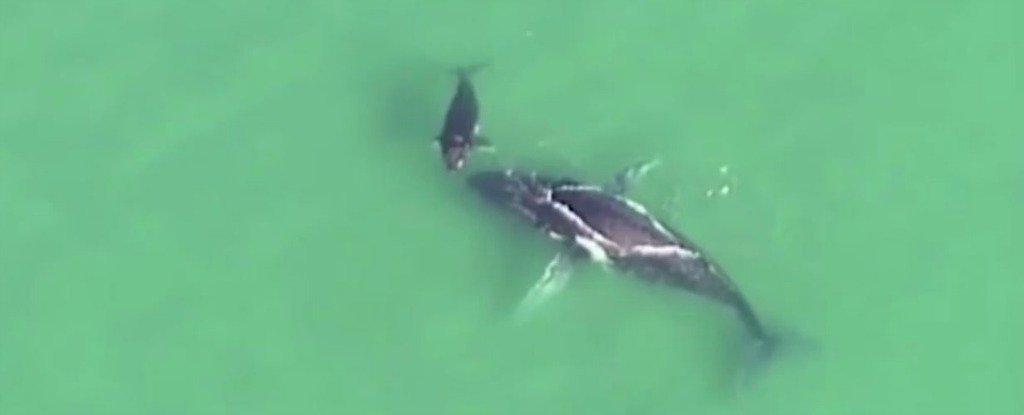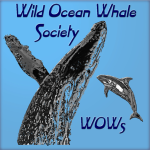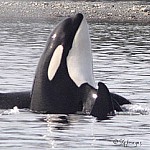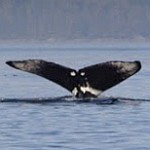Rare Pilot Whales Reported, but Humpbacks Still the Majority
Reports of Cetacea where the reporter is unsure of the species happens more often than you might think. Quite often we can determine the species from more information or a photo, but not always. Since Pilot Whales are not common to our inside coastal waters, we do a bit of extra digging. Although we have one report showing as Pilot Whales, even that one was a “possible”. The other potential Pilot Whale sightings are listed under the Species Unsure heading since we could not obtain further confirmation.
Humpback Whales are still hold the majority of our Sightings Reports as many of these whales are transitting the area. And just when you expect them all to be heading South, we have many that head North again. As our weather turns colder, it will be most interesting and unusual to find more Humpbacks staying in our waters.
Southern Resident Orca were spotted in lower Georgia Strait, and a few other Killer Whales were seen near the top end, but overall, the Orca sightings are down. Some groups of Dolphins and Porpoise also have been seen, but once again, not in any great numbers. Keep looking, they are out there somewhere.
Susan MacKay, Wild Ocean Whale Society
Our team of Volunteers continue to do a great job in making sure all your reports are mapped and published each week.
DONATE
to the non profit wild ocean whale society
Sightings Update
SIGHTINGS MAP 2016-036
Jump to: Biggs Orca | SRKW Orca | Orca | Humpback Whales | PWS Dolphins | Pilot Whales | Dalls Porpoise | Species Unsure
TRANSIENT BIGGS KILLER WHALES
Sat Oct 22 2016
14:00 • 3-4 Biggs Orca heading East in Greene Point Rapids, Cordero Channel. ? Second Hand
SPECIES SUPPLEMENT
SPECIES SUPPLEMENT
Jump to: Biggs Orca | SRKW Orca | Orca | Humpback Whales | PWS Dolphins | Pilot Whales | Dalls Porpoise | Species Unsure
SOUTHERN RESIDENT KILLER WHALES
Wed Oct 26 2016
15:34 • SRKW Orca ?J Pod; K Pod? heading North outside of Porlier Pass in Georgia Strait. Picked up some of K Pod, and most likely all of J Pod. They might be making their way up towards Texada.
Jump to: Biggs Orca | SRKW Orca | Orca | Humpback Whales | PWS Dolphins | Pilot Whales | Dalls Porpoise | Species Unsure
UNIDENTIFIED KILLER WHALES
Wed Oct 26 2016
17:16 • 4 Orca off Cinque Islands, Discovery Passage.
Sat Oct 22 2016
SPECIES SUPPLEMENT
SPECIES SUPPLEMENT
Jump to: Biggs Orca | SRKW Orca | Orca | Humpback Whales | PWS Dolphins | Pilot Whales | Dalls Porpoise | Species Unsure
HUMPBACK WHALES
Wed Oct 26 2016
17:16 • 2 Humpback Whales ?BCY0027 Maude? off Race Point, Discovery Passage. Maude is with her calf.
13:15 • 2 Humpback Whales doing circles, in Menzies Bay, Discovery Passage. Mom and a calf.
Mon Oct 24 2016
13:00 • 2 Humpback Whales off Crescent Bay off the North-West tip of Texada Island, Georgia Strait. Observed from shore. ? Second Hand
11:47 • 1 Humpback Whales moving slowly, heading North off Campbell River, Discovery Passage.
11:43 • 1 Humpback Whales ?BCY0291 KC? heading North in front of Discovery Harbour Marina, Campbell River, Discovery Passage.
11:40 • 1 Humpback Whales near Campbell River, Discovery Passage.
11:20 • 1 Humpback Whales off Campbell River. Small whale. Saw the fluke.
Sun Oct 23 2016
17:47 • 1 Humpback Whales heading North just North of Browns Bay in the middle of Discovery Passage.
16:00 • 2 Humpback Whales off Powell River Westview Harbour, Malaspina Strait. ? Second Hand
15:15 • 3-4 Humpback Whales between Rebecca Rocks and Hardwood Island, Malaspina Strait. ? Observed from Shore
Sat Oct 22 2016
10:13 • 2 Humpback Whales moving slowly, heading North by Stillwater Bay, Malaspina Strait.
Fri Oct 21 2016
17:30 • Humpback Whales breaching, heading South at McMullen Point.
14:22 • 3 Humpback Whales between Rebecca Rocks and Harwood Island, Malaspina Strait. ? Observed from Shore
Wed Oct 19 2016
11:00 • 5 Humpback Whales near Okisollo Channel, Discovery Passage.
Tue Oct 18 2016
15:15 • 2 Humpback Whales milling, in Plumper Bay, Discovery Passage.
14:12 • 2 Humpback Whales in front of Sonora Lodge, Yuculta Rapids. Humpbacks are being harassed by a large raft of 20+ Steller sea lions.
11:41 • 2 Humpback Whales heading North between Subtle Islands and Hill Island, Sutil Channel.
11:41 • 3-4 Humpback Whales South-East of Captain Island heading up Jervis Inlet, Jervis Inlet. ? From Ferry
08:14 • 2 Humpback Whales doing circles, at Race Point, Discovery Passage.
Mon Oct 17 2016
10:48 • 3 Humpback Whales at Fanny Island moving towards Kelsey Bay, Sunderland Channel. Mom and calf.
SIGHTING MEDIA
SIGHTING MEDIA
Sun Oct 16 2016
15:59 • 2 Humpback Whales off Plumper Islands, Blackfish Sound.
Sat Oct 15 2016
12:31 • 2 Humpback Whales between Walcan Seafood Quadra Island and the mill in Campbell River, Discovery Passage.
SIGHTING MEDIA
SIGHTING MEDIA
Thu Oct 13 2016
13:18 • 1-2 Humpback Whales just before Captain Island, Jervis Inlet. ? From Ferry
Tue Oct 11 2016
13:30 • 1 Humpback Whales heading North-East off NW end of Hardy Island, Malaspina Strait. Was taking long dives. ? From Power or Sail Boat
Mon Oct 10 2016
23:30 • 1 Humpback Whales milling, Nocturne Island at the entrance to Blind Bay, Malaspina Strait. We could hear it blowing then saw it off the dock. ? Observed from Shore
SPECIES SUPPLEMENT
SPECIES SUPPLEMENT
SPECIES SUPPLEMENT
SPECIES SUPPLEMENT
Jump to: Biggs Orca | SRKW Orca | Orca | Humpback Whales | PWS Dolphins | Pilot Whales | Dalls Porpoise | Species Unsure
PACIFIC WHITE SIDED DOLPHINS
Mon Oct 17 2016
15:42 • PWS Dolphins in Nodales Channel. With two humpback whales.
Jump to: Biggs Orca | SRKW Orca | Orca | Humpback Whales | PWS Dolphins | Pilot Whales | Dalls Porpoise | Species Unsure
PILOT WHALES
Mon Oct 24 2016
11:43 • 5 Pilot Whales heading North in front of Discovery Harbour Marina, Campbell River, Discovery Passage. About two-thirds the size of an Orca. Dorsal fin half the size of Orca fin. Blows are about 3 feet high.
Jump to: Biggs Orca | SRKW Orca | Orca | Humpback Whales | PWS Dolphins | Pilot Whales | Dalls Porpoise | Species Unsure
DALLS PORPOISE
Sun Oct 23 2016
15:50 • 5 Dalls Porpoise foraging, off Fawn Bluff, Bute Inlet.
Mon Oct 17 2016
15:45 • Dalls Porpoise at Hall Point, Nodales Channel.
Jump to: Biggs Orca | SRKW Orca | Orca | Humpback Whales | PWS Dolphins | Pilot Whales | Dalls Porpoise | Species Unsure
SPECIES UNSURE
Mon Oct 24 2016
11:16 • Species Unsure almost at the Ferry crossing at Campbell River, Discovery Passage. Definitely not Orca.
10:54 • 6-7 Species Unsure heading North past Hidden Harbour closer to Quadra Island, Discovery Passage. Not Humpbacks or Orca.
Fri Oct 21 2016
–:– • 2 Species Unsure moving quickly, off Davis Bay South of Sechelt, Georgia Strait. I was at Davis Bay, Sechelt, and I was on the beach. I look up and see this fin out of the water. It was moving fast so I couldn’t get a good picture. The body was a blackish color. There were two of them as we saw them spraying water with there blow. Also saw splashes from the tail. ? Observed from Shore
SIGHTINGS HEAT MAP 2016-036
SUBMIT sightings
or call 1-877-323-9776 or eMail
we welcome your sighting reports, photographs, video and audio recordings. please review our media submission guidelines
The Magazine
REGIONAL & WEST COAST
TO SEE THIS VIDEO PLEASE CLICK THE IMAGE ABOVE
We got our first look underwater yesterday. Endangered abalone, kelp, juvenile herring all poisoned by diesel. The damage is done. It will be years before we know the full extent of the damage…..
• To support the Heiltsuk Nation with diesel spill efforts you can donate here:
Humpback whales can migrate thousands of miles to reach feeding grounds each year, but a new study concludes that their fidelity to certain local habitats – as passed on through the generations – and the protection of these habitats are key to understanding the ultimate recovery of this endangered species.
The study documents the local recruitment of whales in Glacier Bay and Icy Strait in Alaska over a 30-year period. The researchers found that contemporary whales that utilize these rich feeding grounds overwhelmingly are descendants of whales that previously used the area.
In other words, the population recovery of humpback whales in the region depends on cultural knowledge of migratory routes passed on from mothers to their calves; it is not a product of whales from outside the area suddenly “discovering” a rich feeding ground.
Results of the study are being published this week in the journal Endangered Species Research.
CANADA
Each year, hundreds of bowhead whales fed on zooplankton in Cumberland Sound during the summer season, before travelling to Hudson Strait in the south for the chilly winter months.
Only the blue whale is bigger than the bowhead – so-called because of the shape of its mouth. As the bowhead lives in freezing Arctic waters, its blubber is the thickest of any living animal, which can be nearly half a metre thick.
Sarah Fortune from the University of British Columbia spent four summers researching these elusive creatures. “The team was able to watch the whales and found that they spent the early morning feeding in deep water and then rested in shallow, coastal waters during the afternoon,” Fortune told cbc news….
INTERNATIONAL
Berthold Hinrichs posted a video to YouTube showing his encounter last year hen he encountered a pod of pilot whales off the coast of northern Norway.
One of the whales surfaces right next to the boat and lets off a series of squeaky whale calls.
“I met these guys in northern Norway. I saw them a distance away apparently resting so I stopped my boat and turned off the engine. After a while they swam over to my boat and one of them started talking,” Hinrichs wrote.
Sometimes it’s pink, sometimes greeny-brown. But whatever the colour, whale dung could be the unlikely catalyst for ending whaling.
The role of whale faeces in regenerating fish stocks will occupy centre-stage this week and next at the meeting of the International Whaling Commission (IWC) in Portoroz, Slovenia.
For the first time in the IWC’s 70-year history, delegates attending from member countries will be invited to acknowledge growing evidence that whales don’t decrease fish numbers – the primary excuse for continued whaling by Japan, Norway and Iceland – and they actually have the opposite effect.
Research is revealing that whale dung brings nutrients to the surface waters, which generates food for more fish by stimulating the growth of phytoplankton, the tiny organisms that are eaten by krill. These then become prey for fish. Phytoplankton also suck carbon dioxide out of the air, helping to limit global warming.
Swimming rain forests
Massachusetts lobsterman John Haviland got a grant from the state to test fishing ropes that break more easily under the weight of the animals.
Haviland made a cut in the standard rope and repaired it with a bright orange synthetic sleeve. The sleeve locks in place, just like the Chinese finger trap toy that he played with as a boy.
The sleeve puts a weak link into the rope, and lowers its breaking point from 3,000 pounds of pressure to about 1,600 pounds – enough to allow an endangered North Atlantic right whale to bust free.
It’s one of several solutions scientists are studying.
ith hundreds of thousands of whales and dolphins dying every year after being accidentally entangled in fishing gear, the world must take concrete steps during the International Whaling Commission (IWC) meeting starting today in Slovenia to lessen the serious threat posed by bycatch.
While much of the attention will focus on Japan’s illegitimate “scientific’ whaling programme in the Southern Ocean, participants from over 80 countries will also have a host of other critical issues to discuss, including a proposal for the IWC to kick-start global efforts to reduce fisheries bycatch, which kills at least 300,000 whales, dolphins and porpoises – all known as cetaceans – every year….
Human-produced noise in the ocean is likely harming marine mammals in numerous unknown ways, according to a comprehensive new report from the National Academies of Sciences, Engineering, and Medicine. That’s because there are insufficient data to determine how the ill effects of noise created by ships, sonar signals, and other activities interact with other threats, including pollution, climate change, and the loss of prey due to fishing. The report, which was sponsored by several government agencies and released on 7 October, provides a new framework for researchers to begin exploring these cumulative impacts.
“There’s a growing recognition that ….
Image credit Beau Pilgrim
Eighteen of 21 whale and dolphin species in the Gulf of Mexico had significant quantifiable health problems after the Deepwater Horizon spill, said Teri Rowles, coordinator of the Marine Mammal Health and Stranding Response Program of the National Oceanic and Atmospheric Administration.
The spill was followed by a prolonged increase in the number of deaths of near-shore bottle-nosed dolphins on the Louisiana coast, Rowles said at the briefing. Studies of both living and dead dolphins revealed moderate to severe lung disease, apparently a result of breathing at the surface amid floating oil and dispersant chemicals, she said. Studies also indicated a decrease in reproduction among the dolphins, she said.
Both health problems continue, she said.
“The lung injury isn’t going away, and the reproductive failure is not going away, as of 2015,” Rowles said. “So these effects are long term.”
A small humpback whale calf was witnessed pushing its mother out to sea on Friday, after she got stranded on a sandbank off the east coast of Australia.
The remarkably stressful, yet heart-warming, story unfolded over the course of 40 minutes near North Stradbroke Island, which lies 100 kilometres (62 miles) southwest of Brisbane….
Magazine Submissions
the magazine accepts submissions of links to published articles and media of interest to our readers. we welcome original articles, letters, notices, photography, video and audio
SUBMIT
to the magazine
original material guidelines
notices: 100 words max.; letters & articles: 500 words max.
you or your organization must be authors of the work and are solely responsible for its content. the magazine gives no assurance material submitted will be published. media submission guidelines
DONATE
to the non profit wild ocean whale society
VOLUNTEER
review our volunteer opportunities
SUBMIT sightings
or call 1-877-323-9776 or eMail
we welcome your sighting reports, photographs, video and audio recordings. please review our media submission guidelines
SUBSCRIBE
receive sightings update eMail notices
CONTACT
the wild ocean whale society













